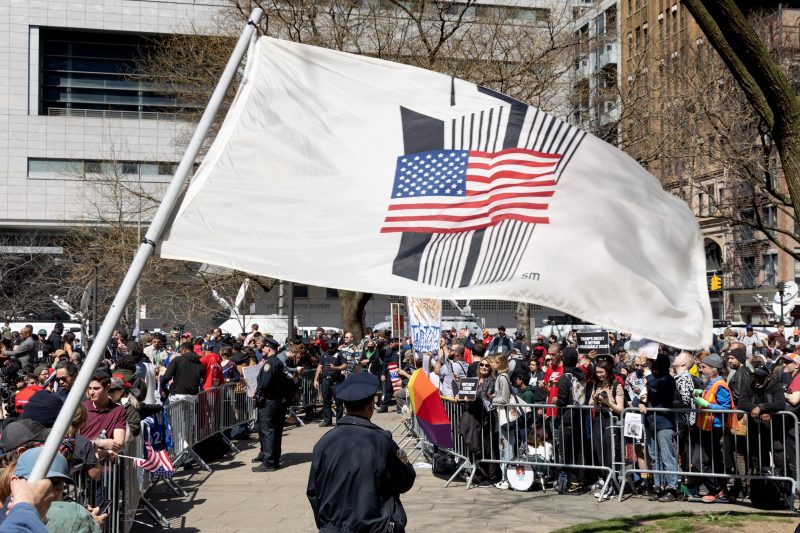On the 22nd anniversary of the 9/11 terrorist attacks, members of the Senate Homeland Security Committee are continuing to press U.S. government officials for unredacted documents related to Saudi Arabia’s involvement in the 2001 attacks, demanding those materials be turned over to the Senate this week.
Neither the Justice Department nor the Federal Bureau of Investigation has provided “complete, unredacted records of Saudi Arabia’s role” in the attacks, despite a July 18 request for those documents from the Senate’s permanent subcommittee on investigations, according to a Sunday letter from the subcommittee to U.S. Attorney General Merrick Garland and FBI Director Christopher A. Wray.
“Tomorrow marks the 22nd anniversary of the 9/11 attacks, which took nearly 3,000 lives and reshaped the world as we then knew it,” wrote Sens. Richard Blumenthal (D-Conn.) and Ron Johnson (R-Wis.), the chairman and top Republican of the permanent subcommittee on investigations. “No one was more affected by these attacks than the families of those whose lives were lost on that day, and who have struggled to obtain accountability ever since.”
Blumenthal and Johnson noted that, after their July 18 request, there was a phone meeting on Aug. 8 between their staff members and officials from the Justice Department and FBI. In that meeting, Senate staffers said government officials should prioritize releasing an unredacted copy of an 11-page document summarizing “Operation Encore,” which detailed ties between the 9/11 hijackers and Saudi nationals. What the U.S. government has released so far about “Operation Encore” has been heavily redacted.
“Over one month since that call and nearly two months since our initial letter request, we have not received a single document or obtained an explanation for any of the hundreds of redactions that remain, despite the government’s recent declassification review,” Blumenthal and Johnson wrote Sunday. “Your failure to respond to our letter only adds to our concerns about the U.S. government’s long-standing refusal to provide full transparency to the American public, and particularly for the families of 9/11 victims, about Saudi Arabia’s role in the 9/11 attacks.”
Blumenthal and Johnson set Thursday as the deadline for the government to provide those documents, as well as a briefing to explain why anything still needed to be redacted.
“Should DOJ and the FBI fail to provide the briefing and continue to fail to provide the requested unredacted documents by this deadline, the Subcommittee will be forced to consider the use of the other tools at its disposal to ensure compliance,” the senators wrote.
Possible next steps would include asking for interviews, briefings or depositions with increasingly senior levels of officials at the Justice Department and FBI, according to a person with knowledge of the process who spoke on the condition of anonymity to discuss the situation. The subcommittee also has the ability to issue subpoenas, which would be considered a last resort.
Representatives for the Justice Department did not respond to a request for comment Monday. A representative for the FBI simply confirmed that the agency had received the senators’ letter.
The most recent letters are part of a lengthy battle by 9/11 families and lawmakers to have the government declassify and release documents related to the terrorist attacks. In August 2021, families of hundreds of victims warned that President Biden would not be welcome at events to commemorate the 20th anniversary of the attack unless he declassified government evidence beforehand that could link Saudi Arabia to the attack — as Biden had promised he would do while campaigning for president.
A few weeks later, Biden signed an executive order that would require the review, declassification and release of classified government documents related to the 9/11 attacks. The order also required the U.S. attorney general to release the declassified documents publicly over the next six months.
The move initially drew praise from lawmakers and cautious optimism from several 9/11 families. That optimism was tempered, however, after some of the documents released under Biden’s executive order remained heavily redacted. Their growing frustration was evident in the senators’ July 18 request for unredacted materials.
“The number of redactions that DOJ, FBI, and other agencies have made in these documents have prevented 9/11 families and the American people from receiving adequate transparency and important access to the information the federal government has about the 9/11 terrorist attacks,” Blumenthal and Johnson wrote then. “While classification of certain information is important, there is a strong public interest in disclosure of all information relating to the worst terrorist attacks that have taken place on American soil.”





























